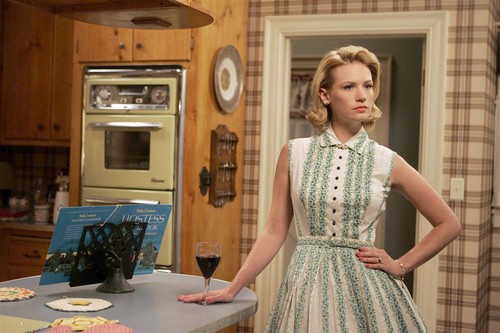
About half way through Mad Men‘s third season, I decided the show had joined my slim TV pantheon. Mad Men joins: Homicide: Life In the Streets; The Sopranos; The West Wing; NYPD-Blue; ER, Star Trek: Deep Space Nine; Firefly; True Love; MI-5. All but the last two, are sadly missed. Shows have their runs, sometimes falling slowly downward, like NYPD-Blue, ER, and DS9 did. One came to a sudden halt–like Firefly. (As did a candidate for highest honors, The Sarah Connor Chronicles; idiots!) The West Wing fizzled out like a dying sparkler. And, another tried to wrap itself up: Homicide. Homicide remains the most enjoyable viewing experience of a serial ‘drama hour’ I’ve had in front of a TV, since I started watching TV as an adult in 1993.
Yet, with my praises noted here, Mad Men is second-to-none for one reason: the Sally Draper character is about the same age I was in 1963. I was nine. Not only that, my mother was a Bryn Mawr graduate (’48,) as is Betty Draper. And, might as well admit my father had Hollywood good looks, was not in anyway introspective, and, about at Don Draper’s level of non-mastery of relationships. So, I’m part of the particular cohort of Mad Men fans who can resonate with the show on a personal, historical level; say of those fans born before 1956.
Given this fact of memory, it is the story arc of Betty and Don that grips me the most. Betty, is the ambivalent, lonely, stern child-woman, who yearns to be fathered, but cannot also name this same yearning. Where her estranged husband’s self-deceptions serve a purpose, Betty Draper’s are threaded in an inaccessible-to-her weave of her personality. For me, she’s the most complicated and saddest character in the story.
At the same time, Betty Draper is the character who could find her way to her full self in surprising, intriguing ways. She’s the most self-estranged at the same time her possible aspirations are the most undefined. Obviously, Betty has yet to figure out what she’s cut out to master. I hope we get to see.
Betty is not like my own mom, who was a college professor in 1963, and was in the vanguard of self-realized women of her generation. Betty Draper is not very popular among the show’s fans. I note how much of this negative view is inflected by prejudices about mothers that seems to me to issue from a contemporary conflict between idealization of the nuclear family, and, the benefits of being insightful about one’s self. The latter strikes me as a recent psychological development to which the dull workmanlike housewife is the problematic predicate.
That Mad Men inches toward, first, the cusp, and later, realization of cultural evolution that will mightily impact the generation of the Draper’s children—yes, Sally—will be especially, and eventually poignant. That is, if Mad Men can carry on through the late sixties. I hope it does, because the differentiation between the parents of the greatest generation and their kids, was dramatic, and would make for great TV drama.
All the Madison Avenue striving in Mad Men, to me, seems secondary to the subtext of family. And, it’s the family that will be shook up by the coming cultural tremors and quakes of the late sixties. We’ll hopefully see if Mad Men’s auteur, Matthew Weiner also sees it this way.
